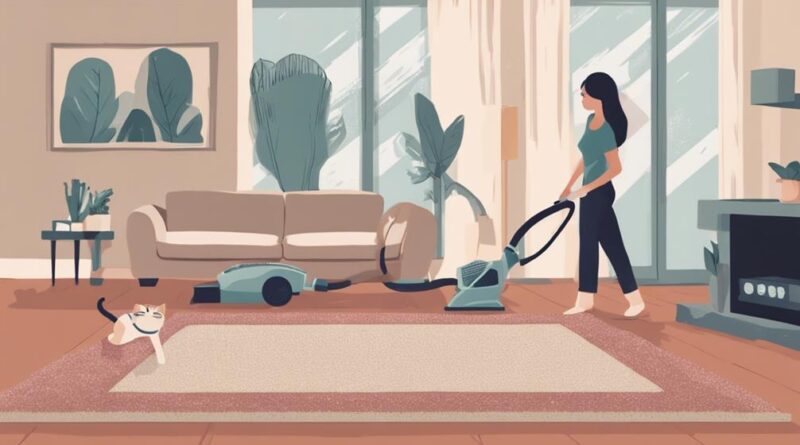What Are Effective Ways to Manage Cat Allergies in Apartments?
To effectively manage cat allergies in apartments, you need to understand what triggers them and how to minimize their impact. By implementing strategies like reducing cat allergens in the air, creating allergy-free zones, and using HEPA filters, you can significantly improve your living environment.
But what about those who have already tried the basics and are still struggling with allergies? There are more advanced steps you can take to manage cat allergies effectively, so let's explore some additional options beyond the usual recommendations.
Understanding Cat Allergies
If you find yourself sneezing or itching around cats, understanding cat allergies is essential for managing your symptoms effectively. Cat allergies are typically triggered by proteins found in a cat's skin cells, saliva, and urine. When these allergens come into contact with your body, your immune system may overreact, leading to various symptoms such as sneezing, itching, watery eyes, and even asthma in severe cases.
Managing cat allergies involves both avoiding exposure to allergens and alleviating symptoms when exposure occurs. To effectively manage your symptoms, it's crucial to identify your allergy triggers. Common allergy triggers in cats include dander, saliva, and urine. By knowing what specifically triggers your allergies, you can take targeted steps to minimize your exposure.
Symptoms management is another key aspect of dealing with cat allergies. Over-the-counter antihistamines can help reduce sneezing and itching. Nasal corticosteroid sprays can alleviate nasal congestion and inflammation. For more severe allergies, your doctor may recommend allergy shots to desensitize your immune system over time.
Minimizing Cat Allergens in Air
To minimize cat allergens in the air, regularly vacuuming and dusting your apartment is essential. This practice helps to remove cat hair and dander, which are common allergens that can float in the air. Additionally, incorporating the use of air purifiers can further improve the air quality in your living space. These devices work by filtering out airborne particles, including cat allergens, providing you with cleaner air to breathe.
Another effective way to reduce cat allergens in the air is by controlling dander through specific measures.
Tips for Minimizing Cat Allergens in Air:
- Invest in Air Purifiers: Consider purchasing a high-quality air purifier designed to capture and eliminate pet allergens from the air.
- Regularly Groom Your Cat: Brushing your cat frequently can help reduce the amount of loose fur and dander that contributes to airborne allergens.
- Use Dander Control Products: Explore dander control products such as wipes or sprays that can help mitigate the spread of allergens in your apartment.
Creating Allergy-Free Zones
Creating allergy-free zones in your apartment can provide a safe and comfortable space for those with cat allergies. To achieve this, consider using allergy-free furniture covers on sofas, chairs, and beds. These covers act as barriers, preventing cat dander and hair from settling into the fabric and making it easier to clean and remove allergens.
In addition, designating pet-free bedrooms can significantly reduce allergen exposure. Keep your bedroom door closed at all times to prevent your cat from entering and lounging on the bed or furniture. This simple step can help create a sanctuary where you can sleep and relax without the presence of allergens.
When creating allergy-free zones, it's essential to regularly clean and vacuum these areas to maintain a low allergen environment. Wash bedding and furniture covers frequently in hot water to remove any accumulated cat dander. Consider using a vacuum cleaner with a HEPA filter to effectively trap and contain allergens during cleaning sessions.
Using HEPA Filters
Consider incorporating HEPA filters into your apartment's ventilation system to help reduce cat allergens in the air. HEPA filters are highly efficient at capturing small particles, including cat dander, fur, and other allergens that may be circulating in your living space.
Here are some key points to keep in mind when using HEPA filters:
- Air purifiers: Investing in a quality HEPA air purifier can significantly improve the air quality in your apartment by trapping allergens that would otherwise be inhaled. Place the air purifier in commonly used areas for the best results.
- Maintenance: Regular maintenance is crucial for the optimal performance of HEPA filters. Follow the manufacturer's instructions for cleaning or replacing filters to ensure that the filter remains effective in capturing cat allergens.
- Filter replacement: Keep track of the recommended filter replacement schedule provided by the manufacturer. Over time, filters can become clogged with debris, reducing their effectiveness in removing allergens from the air. Replace filters as needed to maintain clean and allergen-free air in your apartment.
Regular Cleaning Strategies
Regularly clean your apartment using specific strategies to effectively reduce cat allergens and create a healthier living environment. Establishing a consistent cleaning schedule is crucial for allergen control. Vacuum carpets, rugs, and upholstery at least twice a week using a vacuum cleaner equipped with a HEPA filter to capture pet dander effectively. Additionally, consider steam cleaning carpets periodically to eliminate embedded allergens.
When dusting, use a damp cloth or a microfiber cloth to trap and remove allergens instead of dispersing them into the air. Pay close attention to areas where your cat spends a lot of time, such as their favorite lounging spots or sleeping areas. Wash your cat's bedding regularly in hot water to help reduce allergen accumulation.
In addition to cleaning surfaces, focus on minimizing carpeting issues. If possible, consider replacing carpets with hardwood, tile, or linoleum flooring, as these are easier to clean and don't trap allergens as much as carpets do. If removing carpets isn't an option, make sure to vacuum them thoroughly and consider using a high-quality carpet cleaner designed to target pet dander.
Choosing Hypoallergenic Cats
To further manage cat allergies in apartments, exploring hypoallergenic cat breeds can be a proactive step in creating a more allergen-friendly living environment. When choosing hypoallergenic cats, consider the following:
- Breed Selection
- Opt for cat breeds known to produce fewer allergens such as Balinese, Russian Blue, or Sphynx. These breeds are less likely to trigger allergic reactions in sensitive individuals.
- Keep in mind that no cat breed is completely hypoallergenic, but selecting breeds with low shedding tendencies or less dander can help reduce the allergen levels in your home.
- Research different hypoallergenic breeds and spend time with them to see how your allergies react before making a final decision.
- Grooming Techniques
- Regular grooming is essential for managing cat allergens, regardless of the breed. Brush your cat often to reduce loose fur and dander in your living space.
- Consider using grooming wipes specifically designed to reduce allergens on your cat's fur.
- Bathe your cat occasionally with a hypoallergenic shampoo to further minimize allergens on their coat.
Consulting With a Vet

When seeking guidance on managing your cat allergies in apartments, consulting with a vet is crucial for personalized advice and assistance tailored to your specific situation. A vet can conduct allergy testing to determine the specific allergen triggering your symptoms. Through this testing, you can pinpoint the exact cause of your allergies, whether it's dander, saliva, or urine, allowing for targeted treatment strategies.
Moreover, vets can recommend suitable treatments based on the severity of your allergies. This could include suggesting dietary adjustments or supplements that may help alleviate your symptoms. For instance, certain nutrients like omega-3 fatty acids or probiotics can support your immune system and potentially reduce allergic reactions to your cat.
Managing Allergies With Medication
If you're experiencing persistent cat allergy symptoms, consider using over-the-counter antihistamines to manage your reactions. These medications can provide relief from common allergy symptoms like sneezing, itching, and a runny nose. It's important to consult with a healthcare provider or pharmacist to find the right antihistamine for you.
Here are some key points to consider when managing your cat allergies with medication:
- Allergy relief: Over-the-counter antihistamines are a common and effective way to alleviate symptoms such as itching, watery eyes, and hives caused by cat allergies. These medications work by blocking histamine, a substance produced by the immune system in response to allergens like cat dander.
- Medication options: In addition to antihistamines, nasal corticosteroids can also be beneficial in managing cat allergy symptoms. These sprays reduce inflammation in the nasal passages and can help with congestion and sneezing. Decongestants are another option to consider for relieving nasal congestion, but they should be used with caution and under the guidance of a healthcare provider.
- Consultation: Before starting any new medication regimen for your cat allergies, it's essential to consult with a healthcare professional. They can provide personalized recommendations based on your specific symptoms and medical history. Additionally, they can help you navigate any potential side effects or interactions with other medications you may be taking.
Frequently Asked Questions
Can Wearing a Face Mask Help Reduce Cat Allergies in Apartments?
Wearing a face mask can indeed help reduce cat allergies in apartments by providing respiratory protection from pet dander. It acts as a barrier, preventing you from inhaling allergens that trigger your symptoms.
When properly worn, a face mask can limit your exposure to cat dander, helping to alleviate allergic reactions. Consider using one when cleaning or being around areas where pet dander may be present to manage your allergies more effectively.
Are There Any Specific Types of Flooring or Furniture That Are Better for Reducing Cat Allergens?
When looking to manage cat allergies in apartments, consider flooring options like hardwood or tile, as they're easier to clean and less likely to trap allergens.
Opt for furniture with smooth surfaces that can be wiped down regularly.
Implement a cleaning routine using a HEPA vacuum and damp cloth to reduce allergens.
Improve ventilation by using air purifiers and opening windows when possible.
These strategies can help minimize cat allergens in your living space.
How Can I Prevent My Cat From Tracking Allergens Throughout the Apartment?
To prevent your cat from tracking allergens throughout the apartment, place a litter box with a mat outside to catch particles.
Incorporate a regular grooming routine to reduce shedding. Brush your cat frequently and wipe their paws when they come inside.
These simple steps can help minimize the spread of allergens and keep your living space cleaner and more comfortable for you.
Are There Any Natural Remedies or Supplements That Can Help Alleviate Cat Allergies?
If you're looking for relief from cat allergies, consider trying herbal remedies and supplements. Some people find that dietary changes, such as incorporating probiotics, can also help alleviate symptoms. These natural approaches may provide some relief and could be worth exploring alongside any other management strategies you have in place.
Be sure to consult with a healthcare provider or allergist before making any significant changes to your routine.
Can Air Purifiers Be Effective in Managing Cat Allergies in Apartments?
Air purifiers with HEPA filters are effective in managing cat allergies in apartments. They trap pet dander particles, but regular maintenance is crucial for optimal efficiency. Improving ventilation systems can also help reduce allergens indoors. Place air purifiers in rooms where your cat spends the most time to decrease allergens and alleviate symptoms.
This proactive approach can provide relief from cat allergies and improve indoor air quality.
Conclusion
Overall, managing cat allergies in apartments can be challenging but with the right strategies in place, it's possible to create a comfortable living environment.
By understanding cat allergies, minimizing allergens in the air, creating allergy-free zones, using HEPA filters, regular cleaning, choosing hypoallergenic cats, consulting with a vet, and possibly using medication, you can effectively manage your allergies and still enjoy the company of your feline friend.
